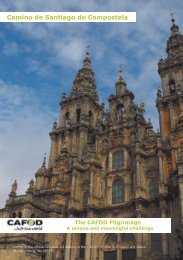Religious Education Curriculum Directory (3-19) - The Catholic ...
Religious Education Curriculum Directory (3-19) - The Catholic ...
Religious Education Curriculum Directory (3-19) - The Catholic ...
- No tags were found...
You also want an ePaper? Increase the reach of your titles
YUMPU automatically turns print PDFs into web optimized ePapers that Google loves.
<strong>Religious</strong> <strong>Education</strong> <strong>Curriculum</strong> <strong>Directory</strong>other disciplines present their knowledge. However, it should not simply be regarded as one subjectamong many, but should be the key element in an inter-disciplinary dialogue. <strong>The</strong> presentation ofthe Christian message influences the way in which, for example, the origins of the world, the senseof history, the basis of ethical values, the function of religion in culture, the destiny of the humanperson, and our relationship with nature, are understood. <strong>Religious</strong> <strong>Education</strong> in schools underpins,activates, develops and completes the educational and catechetical activity of the whole school. 13<strong>Religious</strong> <strong>Education</strong> is concerned not only with intellectual knowledge but also includes emotionaland affective learning. It is in the mystery of the Word made flesh that the mystery of what it is tobe human truly becomes clear. Without religious education, pupils would be deprived of an essentialelement of their formation and personal development, which helps them attain a vital harmonybetween faith and culture. Moral formation and religious education also foster the development ofpersonal and social responsibility and other civic virtues; they represent, therefore, an importantcontribution to the Common Good.In the context of the <strong>Catholic</strong> school, <strong>Religious</strong> <strong>Education</strong> is part of and completed by other formsof the ministry of the word (catechesis, homilies, liturgical celebration, etc.). Participation in worshipand prayer assists understanding of learning, as does engagement with ecclesial life and the outreachof the school in works of charity and justice. Experience and knowledge continually interrelate todeepen a pupil’s learning.For this reason classroom <strong>Religious</strong> <strong>Education</strong> is a core subject in the <strong>Catholic</strong> school, whilst thewider dimensions of learning through liturgy and outreach are integral to the project of <strong>Catholic</strong>education. <strong>The</strong> content of <strong>Religious</strong> <strong>Education</strong> will help the pupil to make a critique of all otherknowledge, leading, for example, to an understanding of the relationship between science and religionor history, and between theology, sport and the human body.Pope Benedict XVI, speaking to religious educators, stressed the need to enlarge the area of our rationality,to reopen it to the larger questions of the truth and the good, and to link theology, philosophyand science. <strong>The</strong> religious dimension contributes to the overall formation of the person andmakes it possible to transform knowledge into wisdom of life. <strong>Catholic</strong> <strong>Religious</strong> <strong>Education</strong> contributesto that goal when:school and society are enriched with true laboratories of culture and humanity in which, by interpretingthe significant contribution of Christianity, the person is equipped to discover goodness andto grow in responsibility, to seek comparisons and to refine his or her critical sense, to draw from thegifts of the past to understand the present better and to be able to plan wisely for the future.’ 144
















